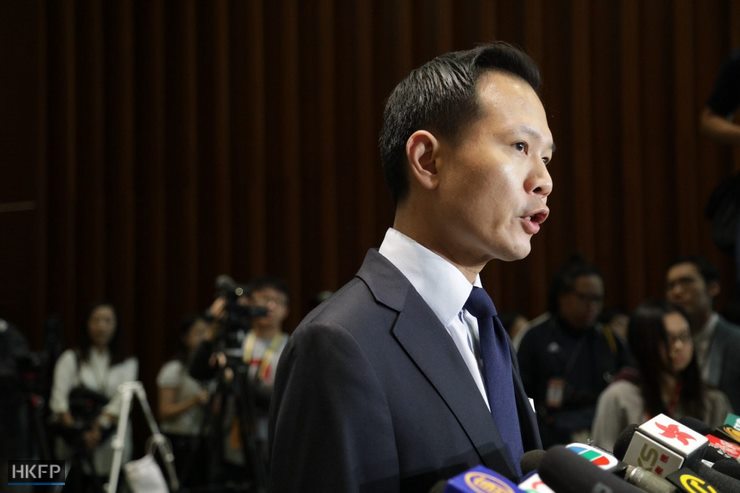The pro-democracy Civic Party has censured Beijing for effectively amending Hong Kong’s mini-constitution in the form of an interpretation. It said the move will create “massive uncertainty” in the territory’s legal system.
The Civic Party’s comment is in response to the decision of China’s top legislature, the Standing Committee of the National People’s Congress (NPCSC), to pass the The NPCSC’s interpretation of the Basic Law Article 104 of the Hong Kong Special Administrative Region with unanimous support on Monday.

Article 104 of the Basic Law stipulates that lawmakers, members of the judiciary and public officers must, “in accordance with law,” swear allegiance to the Hong Kong SAR.
Monday’s interpretation defined the term “in accordance with law,” which now means that oath-takers must “fulfil the statutory requirements in format and content” by “accurately, completely and solemnly” reading out phrases such as the full name of Hong Kong.
It warns that those who make a “false oath” or break their oath – which it says is legally binding – are not allowed to retake their pledges and will bear “legal responsibility.”
‘Amendment, not interpretation’
Barrister and lawmaker Alvin Yeung Ngok-kiu of the Civic Party said his party considered Beijing’s move as an amendment of the law, rather than an interpretation. Article 159 of the Basic Law sets out the procedure for amending the mini-constitution, but the procedure is an onerous one.
Yeung said the interpretation was concerning not only for Yau Wai-ching and Baggio Leung Chun-hang, but also for other lawmakers who had to retake their oaths. Sociologist Lau Siu-kai said that lawmakers who challenge China’s sovereignty are at risk of disqualification despite having been sworn-in.

“Do not try to take advantage, let me warn the pro-Beijing camp,” Yeung said. “I believe the pro-democracy camp will be united, and Hong Kong people have clear eyes.”
Yeung added that the controversy is a political one but is being handled by legal means. “Even the pro-Beijing camp had agreed this matter could be handled locally This affects the public’s confidence in the One Country, Two Systems policy,” he said.
‘Unprecedented damage to the rule of law’
Legal sector lawmaker Dennis Kwok Wing-hang of the Civic Party said the term “in accordance with law” in the interpretation can be expanded without limitation, as it could be used to interpret local laws such as the Oaths and Declarations Ordinance as well.
He said Beijing is interfering with domestic legislation, which must be “enacted through the Hong Kong legislature and nobody else.” He deemed the damage to the rule of law “unprecedented.”
Kwok said the interpretation came at the worst time, when a court case is still ongoing. “It created massive uncertainty,” he said.

The Civic Party’s Jeremy Tam Man-ho also criticised the interpretation for conferring the power to determine whether lawmakers took their oaths “sincerely” on the Legislative Council Secretary-General, an unelected civil servant.
Chief Executive Leung Chun-ying said on Monday that the NPCSC had used its power “carefully.”
“This is only the fifth time in almost 20 years,” Leung said, adding that Chinese officials have a good understanding of the situation in Hong Kong as they have “instant access to information about Hong Kong.”
Pro-Beijing lawmaker Junius Ho Kwan-yiu said he welcomed the interpretation. “Hongkongers have been disappointed and angry about the oath-taking row. This interpretation helps us move forward,” he said.
Dennis Kwok, representing Hong Kong’s legal sector, is organising a silent march on Tuesday in protest of the NPCSC interpretation.
